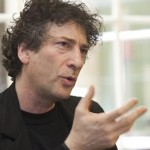A few years ago, when I read American Gods, likely at the behest of Son One, I was surprised at how much I enjoyed it. I may have waded in expecting some nifty ideas and a dumbed-down bit of guilty-pleasure genre reading, but it was much better than that. Recently, through a Twitter accident, I’ve been reading Neil Gaiman’s blog and watching some of the videos attached to it, and find him a thoroughly engaging and admirable
person. I love his simple and humble description of what he does for a living — I make things up and I write them down — and I will read more Gaiman. The quote below, on the lasting quality of the analog book form, comes from a superb speech he made in support of The Reading Agency, a British supporter of the whole wonderful business — threatened, in so-called “developing countries” everywhere — of libraries and reading and the fuelling of imagination. I think of it as his “We Have an Obligation to Imagine” speech, and it’s fine, all of it. This reluctant e-reader particularly enjoyed his defence of the non-digital book:
“I do not believe that all books will or should migrate onto screens: as Douglas Adams once pointed out to me, more than 20 years before the Kindle turned up, a physical book is like a shark. Sharks are old: there were sharks in the ocean before the dinosaurs. And the reason there are still sharks around is that sharks are better at being sharks than anything else is. Physical books are tough, hard to destroy, bath-resistant, solar-operated, feel good in your hand: they are good at being books, and there will always be a place for them…”
Neil Gaiman (b. 1960) is the English author of the Sandman graphic novels, and of books like American Gods, Coraline and The Graveyard Book. He has won the Hugo, Nebula, Carnegie and Newbery book awards. Son One was right.


“Stubbornly contrarian”? Thank you. And so very accurate. I rank that, as a compliment, as high as the colleague who referred to me as “anti-colonial in his methods and beliefs” and “one that stands alone in his unconventional methodology”; she stated it proudly in support of my efforts.
You always assist me with defining aspects of who I am. Stubborn I knew. Contrarian is new. Oddly, contrarian, in one aspect, means obstinant, which in turn means stubborn: so you referred to me as “stubbornly stubborn!”. When it comes to teaching, I resemble that observation.
Wow! Gaiman’s speech used a lot of words to illustrate a singular point. Read. As a teacher of grade 5, finding students that like to read is becoming more and more a rarity. And to find one that wants to read the stuff that the curriculum (school board) wants me to get them to read is almost zero. If reading is such an integral aspect of raising innovative and imaginative children, and that quality is as important as it is said to be, then why are we so ill-prepared to teach them that very thing? My students will avoid reading through strategies that can only be described as sheer genius. Or, at least, they used to be.
The best way to have students want to read is to demonstrate how much fun it is and how important it is to my life. I read to them. A lot. Mystery House. My Grandfather’s Pencil. Humpty Dumpty Was Pushed. The Book of Useless Facts. Malala. A Bad Case of Stripes. And any number of Patricia Polaco books, to name but a few. I talk to them about what I read, about books I buy and why. I bring books to class and let kids read them (I have made my library, about 1000 books (conservative guess), available to them). I also make reading an important part of every day. I think. I hope. I have students reading for information, for pleasure, and some…because I said so. But they’re reading. And I don’t care what they are reading; school-appropriate is my only caveat. I have challenged my students to read 100 books this year (since returning from Christmas break) and some are already well on their way. But teaching from the world of leveled books, and patterned, mindless drivel, sends me students who generally hate reading. If reading is so important, why are we so pitiful at conveying its importance to young readers?
Even I, when I was younger, hated to read and write. That is, unless it was somehow taboo or risque! Them I wanted to write it or read it. I remember trying to plod through “Are You There God? It’s Me, Margaret!” only because a friend told me that there was a racy scene in there. I read and read and read but never ever found what he was talking about. Big disappointment!
Gaiman has a point, many points, in his speech. There is a connection between illiteracy and miscreant behaviour. My students, when they read instruction and fail to comprehend what to do or how to approach the problem, resort to what they know, off-task behaviour. A large jump, I know, but a glimpse of his point [about criminality and literacy] in infancy.
I want my kids to be interested and interesting. I want them to want to be good readers. But what I want does not matter. What my kids want does. The best that we can do is to provide the opportunity: the proverbial trough that I want them to take a drink from.